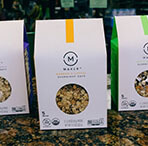
October is Non-GMO month, our chance to raise awareness about how choosing non-genetically modified foods can promote a healthy diet and sustainable agricultural practices. Protecting and building a non-GMO food supply is critical to preserving the biodiversity of our agricultural system. What does Non-GMO mean?
To understand Non-GMO let’s first understand what GMO means. GMO stands for Genetically Modified Organisms. In short, food that has been made through genetic engineering. This process involves identifying the genetic information—or “gene”—that gives an organism (plant, animal, or microorganism) a desired trait, copying that information from the organism that has the trait, inserting that information into the DNA of another organism, and then growing the new organism. By adding these new genes, genetic engineers hope the plant will express the traits associated with the genes. For example, genetic engineers have transferred genes from a bacterium known as Bacillus thuringiensis or Bt into the DNA of corn. Bt genes express a protein that kills insects, and transferring the genes allows the corn to produce its own pesticide.
So a “Non-GMO” claim on food suggests that all ingredients were derived from plants, animals, or other organisms whose genetic material has not been artificially altered in a laboratory.
Despite biotech industry promises, there is no evidence that any of the GMOs currently on the market offer increased yield, drought tolerance, enhanced nutrition, or any other consumer benefit. In the absence of credible independent long-term feeding studies, the safety of GMOs is unknown. Increasingly, citizens are taking matters into their own hands and choosing to opt out of the GMO experiment. By the end of 2022 the United States Department of Agriculture will require all food companies to label GMOs. So until then, below is a list of the most common GMO foods.
Corn
Soybean
Summer Squash/Zucchini
Canola
Sugar beets
Potatoes
Papaya
Alfalfa
Apples
Animal Products
Microbes & Enzymes

So if you’re looking to avoid GMOs, look for the Non-GMO Project’s Verification label or stick with USDA Certified Organic since a “Non-GMO” claim on its own is not always trustworthy because it is not always third-party verified.
www.nongmoproject.org/gmo-facts
https://non-gmoreport.com/what-is-non-gmo-what-are-genetically-modified-foods/
https://www.greenerchoices.org/non-gmo-mean/
https://livingnongmo.org/connect/non-gmo-month/




